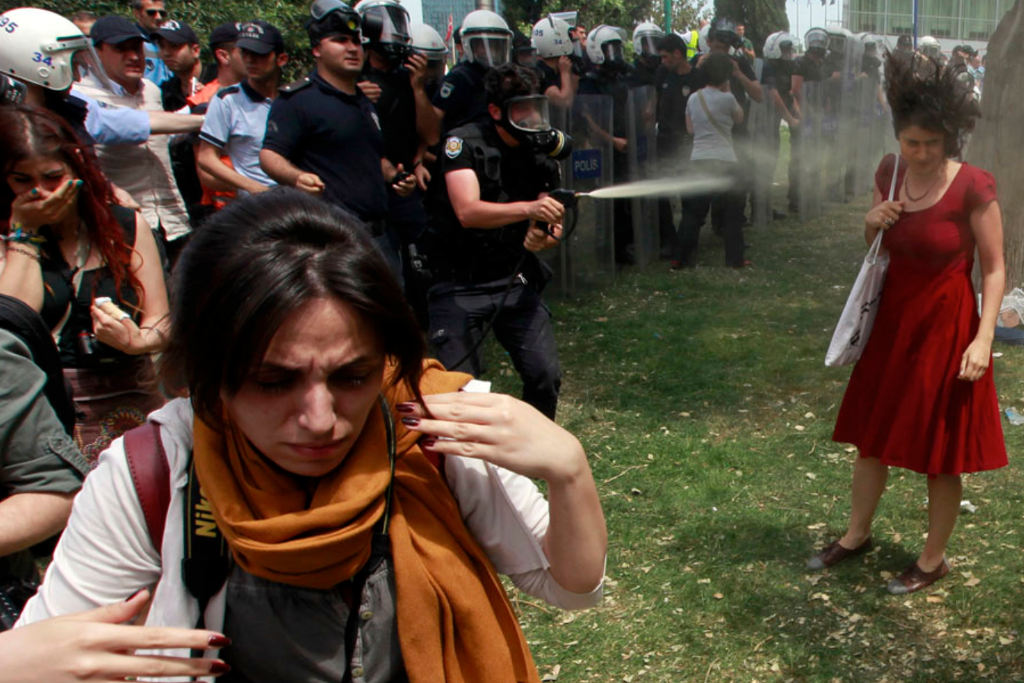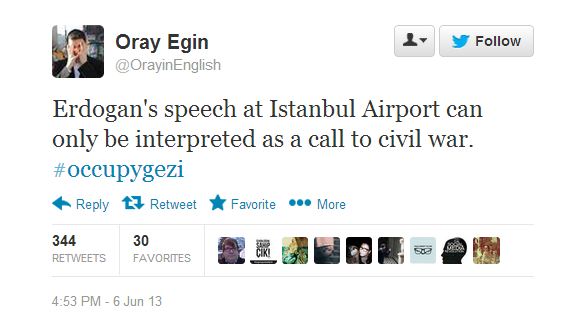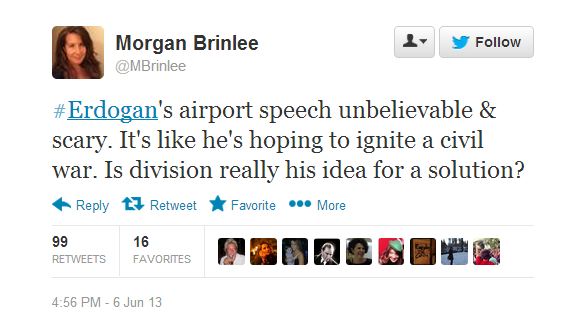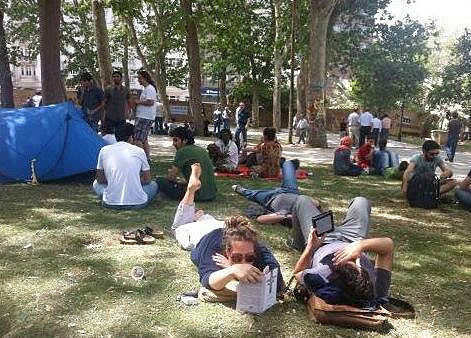Junk Explained: #OccupyGezi, Protests In Turkey, And What Happens Next
Imagine Julia Gillard standing on a podium screaming threats to “choke” and “strangle” those who spoke out against her. What's happening in Turkey should be of concern to everyone.

Imagine Julia Gillard standing on a podium screaming threats to “choke” and “strangle” those who spoke out against her. Imagine facing severe charges like imprisonment just for Tweeting out a controversial political opinion. One of the most basic rights we have as democratic citizens is freedom of speech. And the fact that a nation as modern and developed as Turkey is violating these democratic rights should be of concern to everyone.
Fifteen of my relatives currently live in Istanbul. My aunt works right around the corner from Taksim Square, where the anti-government protests sparked last week. She works in the media industry and this alone has always had us worry over her safety — Turkey has imprisoned more journalists than any other country in the world, with 94 reporters in jail according to the Journalists Union of Turkey. But it wasn’t until Prime Minister Recep Tayyip Erdogan’s gut-wrenching speech at 2:40am last Friday morning, in response to the demonstrations, that my concern was amplified a thousand fold.
Returning from his trip to Morocco, PM Erdogan delivered a speech that has been labelled by some as the most provocative in the history of democratic Turkey. His words have now created a severe division between those who support him and his party, the Justice & Development Party (AKP), and those who are against his ‘autocratic’ ruling. And so what began as peaceful protests to save Gezi Park now has the nation’s political future on shaky grounds.


WAIT, WHAT’S BEEN HAPPENING?
A quick recap. For months, environmentalists had taken over Gezi Park in opposition to the government-backed plan to turn the park into yet another shopping mall and residential building: #OccupyGezi. But on May 31, the police intervened — armed with water cannons, tear gas and brutality — and the small, peaceful protest quickly escalated into a large anti-government demonstration, with more and more civilians pouring into Taksim Square over the next few days.
Gezi Park protest before police intervened, via Twitter.
The Turkish media is already shackled by suppression and censorship, so a flood of images and blog posts streamed out of the country via social media sites, sending Twitter into a frenzy late last week. Over two dozen social media users were arrested early on during the protests, pinned with accusation of spreading “false information” about the demonstrations. And at time of writing, over 5,000 people had been injured, and three deaths occurred.
WHY ARE PEOPLE PROTESTING?
Erdogan has been the Prime Minister of Turkey since 2003, but it was the June 2011 election that saw him sworn in with only 50% of the vote. The remaining 50% of the public do not feel that he has fairly represented them, especially with the recent passing of some very conservative laws and policies that are based on Islamic principles. Up until recent times, Turkey was known as a thriving secular nation, and has long been seen as a successful Islamic democratic model for the Middle East. But Erdogan, a center-right religious conservative, has introduced a variety of strict laws, including the restriction on the consumption and selling of alcohol from 10pm to 6am in bars, restaurants and supermarkets; the banning of images that encourage the consumption of alcohol in TV series, films or music videos; and the criminalisation of public displays of affection, such as kissing. The remaining 50% aren’t happy.
An online public poll was carried out from June 3 to 4 by three faculty members of Istanbul’s Bilgi University. A survey of 3,000 protesters found that the civilians did not have a problem with the AKP, but with its leader, PM Erdogan. The main reason why protesters joined the protest was due to Erdogan’s authoritarian attitude (92.4%), closely followed by police brutality (91.3%), violation of democratic rights (91.1%), the news media’s silence (84.2%), and, finally, the issue that sparked the demonstration in the first place: the cutting down of Gezi Park’s trees (56.2%). Of the young people who participated in the protest, 81.2% identified themselves as libertarians and 64.5% as secular.
ERDOGAN’S RESPONSE:
PM Erdogan’s highly provocative speech on Friday morning, delivered to a crowd of 10,000+ pro- and anti-government supporters upon his return from Morocco, further alienated Gezi activists thanks to his harsh accusations and threats. (You can read the full English translation of his speech here).
“‘If someone attacks my ancestors, I strangle them! …We cannot allow anyone in this country to commit illegal acts, to threaten democracy, to smash and burn with vandalism, to attack cities and public property.”
Here, he references a 20th Century poet, Mehmet Akif Ersoy. He goes on to describe the protesters (who he identified as irresponsible journalists, artists and other politicians) as “vandals” and “terrorists”, claiming they were burning cars and hurting the innocent. In response to this part of the speech, a blog post from a Turkish civilian on Translating Taksim has shown that claim to be false: “TRT, Turkish National TV has aired a video from 2010, where [Kurdish] PKK members were burning a flag; claiming that they were Gezi protesters”.
“If a bank’s CEO comes out and says he is on the side of the organizer of this vandalism he should know that he will incur our wrath.”
In the translator’s notes, it is explained that Erdogan was pointing his not-so-veiled threat at the Garantibank CEO, who showed support for the protesters following NTV television’s media blackout.
“No one has the right to attack us over such issues. Our police captain’s unborn child was orphaned in the womb.”
He blamed the protesters for the death of a police officer, as well as the other victims killed during the demonstrations. However, as Translating Taksim notes: “The police officer’s best friend has announced in the media that the police officer was tired and fell off the bridge due to lack of sleep and fatigue”.
“Our citizens who have been manipulated by terror organizations must now see the game that is afoot and withdraw.”
As his speech came to an end, PM Erdogan’s supporters chanted “Give us permission, we will raze Taksim to the ground”, until he finally asked the crowd to go home with dignity.
THE AFTERMATH:
Since that evening, division has deepened and small clashes between pro- and anti-government social groups have erupted. As the protests continued into its tenth day on Sunday, Erdogan went on the offensive, organising rallies of his own across the city.
At these rallies he spoke again to AKP loyalists: “We were patient, we will be patient, but there is an end to patience, and those who play politics behind the protesters should first learn what politics means… those who do not respect this nation’s party in power will pay a price.”
As the Turkish Lira hit an all-time low, PM Erdogan vowed to literally “choke” financial market speculators, who he claimed were growing rich off “the sweat of the people”, and he urged Turks to put their money in state not private banks. “Those who attempt to sink the bourse, you will collapse … If we catch your speculation, we will choke you. No matter who you are, we will choke you,” are the chilling words from the man in power.
PM Erdogan has planned to meet with the organisers of the protests today, to “listen to their thoughts” and hopefully seek out a solution — but he added that these illegal protests must come to an end.
Although we may be over 12,000 kilometres away from the crumbling Islamic democracy, what we can do is use our simple freedoms to help communicate the issues underpinning the Gezi Park movement, as it has gone far beyond saving a small patch of grass.
–
Celline Narinli spends most of her time writing and talking about Australian music on whothehell.net and 2SER FM. She also writes for The Drum Media and Concrete Playground.
Feature image via Reuters/BBC.
